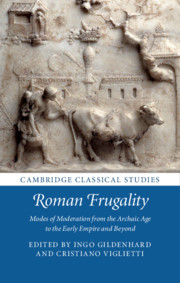Book contents
- Roman Frugality
- Cambridge Classical Studies
- Roman Frugality
- Copyright page
- Contents
- Figures
- Contributors
- Acknowledgements
- Note on Translations
- Abbreviations
- Introduction
- Chapter 1 ‘Frugality’, Economy and Society in Archaic Rome (Late Seventh to Early Fourth Century BCE)
- Chapter 2 From Licinius Stolo to Tiberius Gracchus: Roman Frugality and the Limitation of Landholding
- Chapter 3 Frugality as a Political Language in the Second Century BCE: The Strategies of Cato the Elder and Scipio Aemilianus
- Chapter 4 Smallholding, Frugality and Market Economy in the Gracchan age
- Chapter 5 Frugalitas, or: The Invention of a Roman Virtue
- Chapter 6 Frugality, Building, and Heirlooms in an Age of Social Mobility
- Chapter 7 From Poverty to Prosperity: The Recalibration of Frugality
- Index Locorum
- General Index
- References
Chapter 5 - Frugalitas, or: The Invention of a Roman Virtue
Published online by Cambridge University Press: 26 June 2020
- Roman Frugality
- Cambridge Classical Studies
- Roman Frugality
- Copyright page
- Contents
- Figures
- Contributors
- Acknowledgements
- Note on Translations
- Abbreviations
- Introduction
- Chapter 1 ‘Frugality’, Economy and Society in Archaic Rome (Late Seventh to Early Fourth Century BCE)
- Chapter 2 From Licinius Stolo to Tiberius Gracchus: Roman Frugality and the Limitation of Landholding
- Chapter 3 Frugality as a Political Language in the Second Century BCE: The Strategies of Cato the Elder and Scipio Aemilianus
- Chapter 4 Smallholding, Frugality and Market Economy in the Gracchan age
- Chapter 5 Frugalitas, or: The Invention of a Roman Virtue
- Chapter 6 Frugality, Building, and Heirlooms in an Age of Social Mobility
- Chapter 7 From Poverty to Prosperity: The Recalibration of Frugality
- Index Locorum
- General Index
- References
Summary
The chapter begins by looking into the absence of the noun frugalitas in authors before the first century BCE and traces the reasons for its rise to prominence as a virtue-label in Cicero. This involves consideration of the adjective frugi: primarily used of slaves and freedmen, it was adopted as an agnomen by Lucius Calpurnius Piso Frugi (cos. 133 BCE) in an act of onomastic creativity. Piso’s integration of frugi into his nomenclature ennobled the attribute and thereby facilitated Cicero’s investment in the abstract noun: at two specific moments in his career, here analysed in depth, i.e. the speeches against Verres (70 BCE) and the Tusculan Disputations along with the speech on behalf of king Deiotarus (45 BCE), Cicero made the unorthodox decision to promote frugalitas as a quintessential Roman virtue, thereby setting the stage for its stellar career in imperial times and later centuries. The chapter concludes with a survey of the use authors of the early empire (Horace, Valerius Maximus, Seneca the Elder, Petronius, Seneca the Younger, Quintilian and Pliny the Younger) made of frugi, frugaliter and frugalitas.
Keywords
- Type
- Chapter
- Information
- Roman FrugalityModes of Moderation from the Archaic Age to the Early Empire and Beyond, pp. 237 - 346Publisher: Cambridge University PressPrint publication year: 2020
References
- 1
- Cited by

